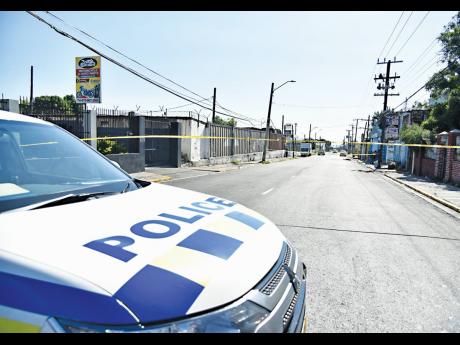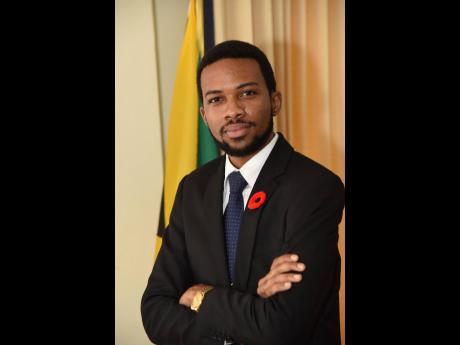David Salmon | Tackling crime at the root
Last week, I had the honour of addressing the 43rd staging of the National Leadership Prayer Breakfast. Held under the theme, “Strengthening Communities Through Peace, Justice, and Forgiveness”, this year’s event underscored the need to rebuild our communities from the ground up or from the root. While the occasion was by no means a platform to outline a raft of policy measures, I would like to to expand on some of the recommendations made.
Crime in Jamaica is caused by a number of factors that largely fall under three broad headings:
1) Actions taken due to antisocial behaviours;
2) Greed and the preservation of economic interests;
3) Efforts to remove rivals and maintain illegal gains.
Unfortunately, none of these causes is addressed with the continued implementation of the states of public emergency. While I am sympathetic to the administration for the need to be seen by the public as taking urgent action, the solution to our crime problem will require a more subtle approach that does not fit well on a billboard or in a campaign song.
TACKLING ANTISOCIAL BEHAVIOUR
Locally, almost all crime committed is in some way linked to antisocial behaviours in our youth. Early intervention is key to minimising these behaviours as they emerge long before a child joins a gang or is caught up in the quagmire of community brinkmanship.
According to a study, domestic and school violence among high school students in Jamaica, 78.5 per cent of the students surveyed had witnessed violence in their communities, 60.8 per cent in their schools, and 44.7 percent in their homes. In fact, 29 per cent of the students, especially boys, 10th-graders, and urban students indicated that they had actually caused injury to persons with a wide assortment of weapons.
At the time, the study concluded that “effective programmes are urgently needed to address the high rate of violence recorded in this study among high school youths in Jamaica”. This conclusion was reached almost 25 years ago!
What Jamaica is experiencing is chickens coming home to roost, but these chickens are armed to the beak with knives, guns, and a hardened mentality. If a child who participated in this 2000 study was on average aged 15 and in 10th grade, that person would be almost 40 right now and has already produced the next generation of Jamaicans. This new generation would have been socialised to believe that violence is the norm.
It is a miracle that we don’t have more school shootings because we have all the ingredients for this toxic milieu. Tackling antisocial behaviour requires an engagement with children before they get to the high-school level.
The Fayval Williams-led ministry has already begun taking commendable steps to reduce violence in schools. Last week, the minister disclosed that her ministry has increased the number of guidance counsellors and trained psychologists. Psychiatrists are also available on demand for student referrals.
Further, the ministry will be partnering with the Ministry of Justice to introduce restorative justice sessions to help students defuse conflicts. It also aims to expand its existing values and attitudes programme in schools.
EARLY INTERVENTION
However, the challenge with these interventions is normally that they are not sustained over an extended period of time, and there are inadequate mechanisms to evaluate impact. Additionally, the focus has naturally been devoted to high schools as this is the level where headline-making incidents of violence occur. This leads to the misallocation of focus, attention, and resources as by that time, certain pernicious values have been formed and fermented in students’ minds.
If there is a desire to promote meaningful change, then as I shared in my speech, “We must teach our children values such as respect, kindness and a love for peace. Imparting this wisdom from as early as the early childhood level is essential ... .”
Also, the education ministry has been steadfast in the implementation of the Primary Exit Profile (PEP). I would implore the ministry to introduce, as a component of the PEP, assessments that determine the level of emotional intelligence students have upon leaving primary school. These assessments should be able to identify the risk factors for antisocial behaviour and determine which students demonstrate characteristics that can lead to the emergence of violent behaviour in school.
Armed with this information, guidance counsellors can now monitor these students by the time they matriculate to grade seven. This should be done instead of the current approach where counsellors have to wade through the fog of trying to identify problematic students after they have been caught with a weapon or have been disciplined for their behaviour. It would also improve the ability of the ministry to monitor and evaluate the implementation of its interventions.
keep boys in school
Currently, if a child is expelled, other schools may admit the student. This was done while I was a student in an attempt to keep boys in school. However, passing around the problem does not solve the issue. That is why early intervention is required.
One of the biggest potholes the education ministry will face with the rollout of its programmes is the chronic shortage of professionals capable of meeting children’s mental- health needs. The 2021 CAPRI study titled Mind the Gap – The Inadequacy of Mental Health Services for Children said, “There is only 30 percent of the requisite clinical staff complement of the principal child mental-health service provider, the Child Guidance Clinics, to meet current demand.”
The report revealed that there are approximately 94 practising psychologists and counsellors in Jamaica and 28 psychiatrists. Of this number, only 12 clinicians provide services predominantly for children. Therefore, the ratio of psychiatrists to population is 1:1,582, and the ratio of community mental-health officers/nurses to population is 1:306. This is contrasted with the international standards of 1:150 and 1:50, respectively.
Compounding this predicament is the fact that there are only three psychiatric clinicians trained to work with adolescents across the island. In per capita terms, this means that there is only one psychiatrist available for every 267,000 children. The report concludes that “given the easy mobility of medical professionals, as long as remuneration for mental-health practitioners in Jamaica remains far below the rest of the region and North America, the staffing needs of Jamaica’s mental-health system will likely never be met”.
To tackle the urgent need for mental-health services, the Government must outline what the long-term plan is to make wages in the field competitive with their contemporaries in North America. Moreover, as a stop-gap measure, the HOPE programme can be used to employ, even on a short-term basis, newly graduated social workers as there are anecdotes of these professionals working in fields that have nothing to do with their specialisation.
If action is not taken on these fronts, then Jamaica should get used to violence in schools and scamming being the common employment activity.
David Salmon is Jamaica’s 2023 Rhodes Scholar. Send feedback to davidsalmon@live.com.


